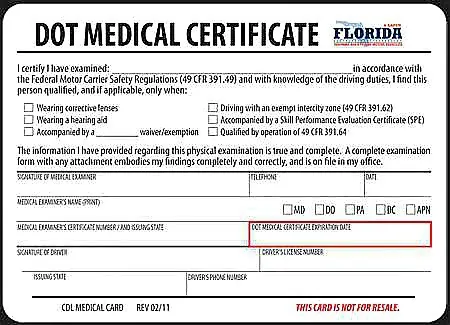Are you going to get a Commercial Driver’s License (CDL) in Delaware? Understanding the Delaware CDL requirements is crucial for anyone dreaming to get a CDL to start the driving career. In short, what you need for a CDL in Delaware ranges from age standards, personal documents, to medical certification and CDL knowledge and skills test. Now let’s scroll down to see the details!
What are Delaware CDL requirements?
Delaware CDL requirements include age standards, proof of citizenship/identity, medical certification, Entry-level Driver Training (ELDT), and CDL knowledge and skills test. Keep reading to discover the details of each requirement!

Age standards
Age standard is the first of Delaware CDL requirements. According to the Federal Motor Carrier Safety Administration, you need to be at least 18 years old to be qualified to drive a commercial vehicle. However, this age standard only allows you to drive within your state.
To drive outside of the state, or to transport hazardous materials you need to be at least 21 years old. Therefore, if you are below these age requirements, consider other appropriate options.
Proof of citizenship/identity/residency
To be qualified for CDL application, you are also required to provide documents proving your legal presence in Delaware, or in the US.
According to Delaware’s DMV, you need to provide one of these documents below to prove your identity:
- U.S. Birth Certificate: Original or certified copy, issued by the Office of Vital Statistics or State Board of Health. Must include parent(s)’ names if under 18.
- Consular Report of Birth Abroad.
- Certificate of Naturalization (N-550, N-570, N-578).
- Certificate of Citizenship (N-560, N-561, N-645).
- Green Card (I-551) (Includes Northern Mariana Card, American Indian Card).
- U.S. Citizen Identification Card (I-179, I-197).
- Valid U.S. Passport (Foreign passport with appropriate INS document required).
- Resident Alien Card (I-515, I-551, AR-3, AR-103).
- Temporary Resident Identification Card (K-688).
- Non-Resident Alien Canadian Border Crossing Card (I-185, I-586).
- Record of Arrival and Departure (I-94, I-94W) (In valid foreign passport).
- Permanent Resident Re-Entry Permit (I-327).
- Refugee Travel Document (I-571).
- Employment Authorization Card (I-688A, I-688B, I-766).
- Canadian Immigration Record and Visa or Record of Landing (IMM 1000).
Acceptable Forms of Identification for Non-U.S. Citizens:
- Federally Compliant State-Issued Photo Driver’s License or ID Card.
- State/Province/Territory-Issued Photo ID Card.
- Court Order: Must contain full name, date of birth, and court seal. (e.g., adoption, name change, gender change).
- Certified Microfilm/Copy of Driver’s License or ID Card.
- Official Letter from Vital Statistics: Verifying full name and date of birth.
- Certified School Records or Transcripts: Verifying full name and date of birth.
To show your Social Security Number, these are acceptable documents
- Social Security card.
- W-2 tax form.
- SSA 1099 form or SSA non-1099 form.
- Pay stub showing the full Social Security number.
- Official document from the Social Security Administration (SSA) containing the full Social Security number (excluding Medicare/Medicaid cards).
- Ineligibility letter from SSA issued due to legal presence status.
To prove you are a legal citizen of Delaware, you need to provide two of the following documents:
- Utility statements.
- Credit card bills.
- Insurance documents for auto or life policies.
- Voter registration documentation.
- Bank account statements.
- Employment-related records.
- Lease or rental contracts.
- Change of address confirmation or forwarded mail from the U.S. Postal Service.
- Recently postmarked non-personal mail (dated within 60 days).
Medical certification
As part of the Commercial Driver’s License (CDL) application process, medical certification is mandatory to ensure drivers meet the physical standards necessary for safely operating commercial vehicles. The medical certification focuses on three main health criteria:
- Vision: Applicants must have adequate vision to safely operate a commercial vehicle, including the ability to distinguish between different colors and maintain proper visual acuity. Specifically, requirements for vision are 20/40 in both eyes (with or without correction).
- Hearing: Applicants are required to have sufficient hearing to hear necessary warning signals, such as horns and sirens, and communicate effectively while driving. CDL applicants must be able to hear a whisper voice at a distance of at least 5 feets in one ear.
- Blood Pressure: Applicants must meet specific blood pressure standards to ensure they do not have conditions that could lead to sudden medical emergencies while driving. According to the FMCSA, applicants’ blood pressure must be 140/90 or lower.
These health standards help maintain road safety by ensuring that CDL holders are physically capable of handling the demands of commercial driving. A certified medical examiner must review the applicant’s health and issue a medical certificate confirming they meet the required criteria.
Entry-level Driver Training
For individuals applying for a Commercial Driver’s License (CDL) for the first time, completing entry-level driver training is a key requirement. This training ensures that new drivers have the necessary skills and knowledge to operate commercial vehicles safely. The entry-level driver training includes the following components:
- Classroom Instruction: Applicants must complete training in traffic laws, safety regulations, and vehicle operation. Topics typically cover topics such as the rules of the road, proper load handling, and safe driving practices.
- Behind-the-Wheel Training: In addition to classroom instruction, applicants must also undergo hands-on driving experience with a qualified instructor. This training focuses on maneuvering commercial vehicles in different environments and handling various driving conditions.
At the end of the training, applicants are evaluated on their skills and knowledge to ensure they are ready to meet the high standards required for CDL holders.
CDL knowledge test
The CDL knowledge test covers the following key areas. These areas are designed to assess your understanding of the rules, regulations, and skills needed to operate commercial vehicles safely. The test content may vary slightly depending on your state, but the general topics include:
- General knowledge test: The General Knowledge test covers safe driving practices, pre-trip inspections, vehicle control, and managing space and speed. Drivers learn to handle emergencies, hazardous conditions, and effective communication on the road, while ensuring compliance with alcohol and drug regulations.
- Air Brakes (if applicable): The Air Brakes section tests knowledge of air brake systems, including components, inspection procedures, and proper braking techniques to prevent issues like brake fade, ensuring safe vehicle operation.
- Combination Vehicle (if applicable): The Combination Vehicles test focuses on operating tractor-trailer setups, including coupling/uncoupling, preventing skids, and managing unique handling characteristics like wide turns and weight distribution.
CDL skills test
The CDL skills test evaluates a driver’s ability to operate a commercial vehicle safely and effectively. It consists of three main parts:
- Pre-trip inspection: The Pre-Trip Inspection tests a driver’s ability to check the vehicle’s key systems, such as brakes, tires, lights, and steering, ensuring it is safe to operate. Drivers must identify potential hazards and demonstrate a systematic approach.
- Basic vehicle control: This subtest evaluates the driver’s skill in maneuvering the vehicle through exercises like straight-line backing, offset backing, and parallel parking. Precision and control are key, with penalties for crossing boundaries or hitting cones.
- On-road driving: The On-Road Driving test assesses the driver’s ability to handle real-world traffic conditions, including turns, lane changes, merging, and navigating intersections. Drivers must follow traffic laws and demonstrate safe driving practices.
FAQs
1. What do I need to get my CDL in Delaware?
What you need to get a CDL in Delaware are proof of citizenship or identity, Medical certification, completing the Entry-level Driver Training, and passing the CDL knowledge and skills test.
2. What are Delaware DOT physical requirements?
DOT physical requirements include:
- Vision: Drivers must have at least 20/40 vision in both eyes, which can include corrected vision using glasses or contact lenses. Peripheral vision of at least 70 degrees in both eyes is also required.
- Hearing: The hearing test ensures drivers can detect a “forced whisper” from a distance of five feet, with or without hearing aids. Drivers must not have hearing loss greater than 40 decibels in their better ear.
- Blood pressure and pulse check: Examiners measure the driver’s blood pressure and pulse to detect hypertension or irregular heart rhythms.
- Urine: A urine sample is analyzed for signs of underlying health issues, such as diabetes, as part of the DOT physical.
- Sleep apnea: Drivers with symptoms like excessive daytime sleepiness, morning headaches, dry mouth, or loud snoring may be tested for sleep apnea.
- Physical examination: The examiner evaluates the driver’s overall health, including their appearance, eyes, ears, throat, heart, lungs, abdomen, vascular system, extremities, spine, and neurological reflexes. Specific conditions like glaucoma, hernias, or musculoskeletal impairments are also assessed.
Final thoughts
Understanding Delaware CDL requirements is a crucial step for anyone dreaming of getting a Commercial Driver’s License in Delaware. Long story short, what you need to prepare are: age standard, proof of citizenship/identity, medical certification, Entry-level Driver Training, CDL knowledge and skills test. Be prepared and determined to successfully get your CDL in Delaware and start to ace your driving career!



